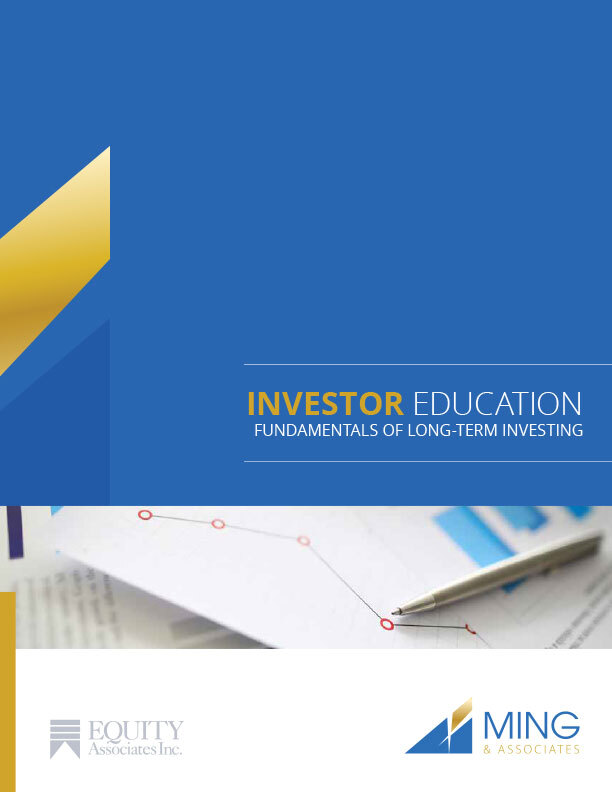We’d love to be able to “do it all” for our clients and give them everything they hope for. It would be great if we could predict what economies and markets will do, move in and out of investments with perfect timing, foresee which industries and companies will fare the best, and recommend only the investments with the highest returns. But to paraphrase noted economist John Kenneth Galbraith on forecasters, “I feel there are two kinds of investment advisors: those who can’t do these things and those who don’t know they can’t do these things.”
At Ming & Associates, we have always prided ourselves at being very honest – with ourselves and with our clients – about what we can and cannot do. Some advisors claim to be able to do it all. Either they really think they can, or they think that to be successful they have to pretend they can.
In any endeavor involving uncertainty, not knowing what lies ahead isn’t nearly as bad as thinking you know if you don’t. If you’re setting out for a drive and recognize that you don’t know the way, you’re likely to check a map or follow a GPS and watch for indications that you’ve gone off course. But if you’re sure you know the way, you’re more likely to skip these things, and if it turns out you didn’t know, it makes it much harder to reach your destination.
Rather than commit the error of overconfidence, we consider it essential to acknowledge the limits of our capabilities and act accordingly.
What Can We Do For You?
The main thing we can’t do is see the future, and particularly the un-expected events that always seem to pop up from time to time. That simple statement has serious ramifications. It means a lot of what we would love to know is simply beyond us;
- we can’t know what the different economies of the world will do at any moment in time
- we can’t know whether various markets will go up or down, and by how much and when
- we can’t know which market or sub-market will do best, and
- we can’t know which security in a given market will be the top performer.
And what does the fact that we can’t know these things mean for our portfolio recommendations?
Simple: it means we must not act as if we can.
If you could know these things, the path to success would be clear. Stick to investments that will do well and avoid the rest. Load up when a market is about to rise and get out at the top. And use maximum leverage when the return will exceed the cost of borrowing.
So, what do you do if you can’t? You should acknowledge your limitations and accommodate your behavior to this reality. The more you acknowledge you don’t know what the future holds:
- the more you should hold a diversified portfolio of investments, constructed in a well thought out manner to make sure you don’t miss the winners, but more importantly, don’t overload on the losers or underperforming investments.
- the less you should attempt to enhance the performance of your portfolio by short term market timing, that is, trying to fool yourself into thinking that you know in the short term markets are going to fall and/or rise, and
- the less you should use leverage (borrowing money to invest)
The difference in behavior between those who think they can know the future and those who don’t is potentially enormous. It’s essential to be on the right side of this choice because, as Mark Twain said.
“It ain’t what you don’t know that gets you into trouble. It’s what you know for sure that just ain’t so.”
That’s an essential component of formulating a sound portfolio.
Why do we accept these limitations so easily?
Our experience has taught us these truths. In addition, we look for role models that we can learn from and the approach that these very successful investors take. A few quotes by Warren Buffet, arguably the most successful investor of all time sums it up best:
“The only value of stock forecasters is to make fortune-tellers look good.”.
He also is constantly urging investors to ignore the media and has stated many times,
“We will continue to ignore political and economic forecasts which are an expensive distraction for many investors and businessmen.”
So, What Can We Do?
Although we can’t forecast the movement of financial markets, there are many things we can do.
Our approach to helping clients is to aid them in understanding these limitations while also ensuring they follow a disciplined approach to investing. To help us communicate and implement this approach with our clients, we follow 3 Guiding Principles required for success:
- Maintain Faith in the Future: Tomorrow really will come and it will be okay.
- Maintain Patience: Persevere through good times and bad: Rome was not built in a day.
- Exercise Discipline: Have a plan and stick with it!!
We then couple these 3 Guiding Principles with 3 Proven Practices in portfolio management:
- Utilize Proper Asset Allocation: Balance risks and rewards to suit goals and needs.
- Utilize Disciplined Diversification: Don’t put all your eggs in one basket, but also make sure you have a sound strategy that is disciplined with thought and reason.
- Recognize that behaviour is the primary determinant of long term success: Understand that most humans are programmed to fail when it comes to investing.
We will continue to ignore the media, pundits and forecasters as we guide our clients through these uncertain times. We will do our best to keep you focused on what matters and to ensure you own quality assets suitable for your goals. By following this approach we strongly feel you greatly increase your chances of success. Please visit our website at mingassociates.com to find out more about Our Approach.
